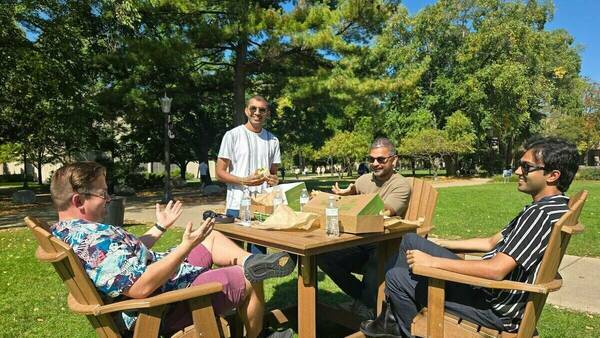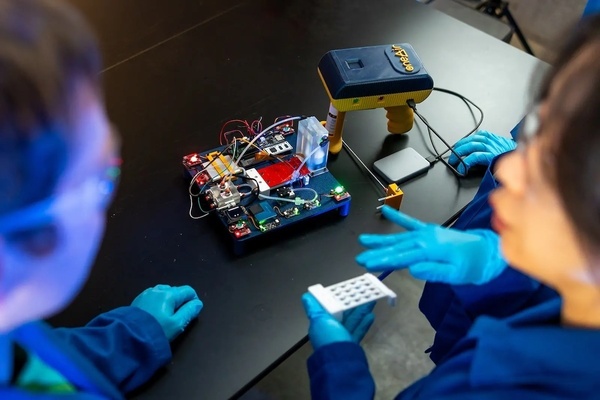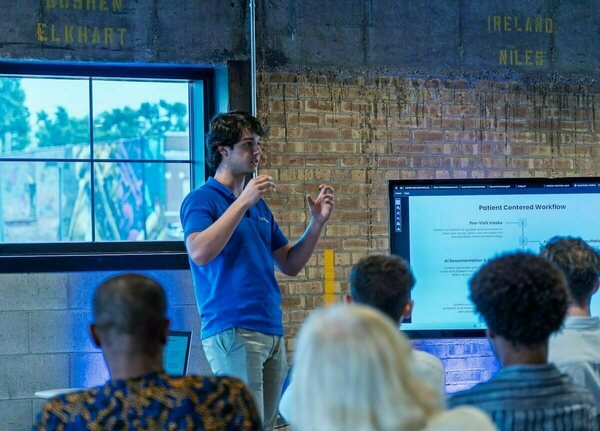Education and poverty: Notre Dame research will inform policy to address global inequality

Education is crucial to addressing poverty and inequality. Research shows that it raises income, lowers unemployment and creates intergenerational opportunities to move out of poverty. One study found that each additional year of quality education is associated with an 8 to 10 percent income boost and discovered that the results are even more dramatic for girls.
But there’s a catch: Many children do not receive a quality education. Globally, more than 125 million children can’t read or work with numbers at a basic level, even after years of schooling, a crisis the World Bank calls “learning poverty.” Low-income countries suffer disproportionately from learning poverty, and it remains a serious problem in places such as sub-Saharan Africa, where 80 percent of children are affected.
This lack of learning threatens to lock in or even worsen existing levels of poverty and inequality. But University of Notre Dame researchers aim to change that. Their project is funded by the Notre Dame Poverty Initiative, a University-wide effort to create a world intolerant of poverty by expanding knowledge about how to solve it.
The team of scholars is embarking on an ambitious project to help scale early-grade reading interventions, working with government and civil society partners in Kenya, Senegal and Uganda. Their research will inform policy to address poverty in a variety of low- and middle-income contexts, from countries in the Global South to marginalized communities within the United States.
“Learning poverty limits children’s future potential and has harmful long-term effects on the trajectory of their lives,” said lead scholar TJ D’Agostino, assistant professor of the practice at Notre Dame’s Keough School of Global Affairs and a core faculty affiliate of the school’s Pulte Institute for Global Development. “That’s the problem we want to address.”
Boosting functional literacy: a poverty reduction strategy
As an education policy scholar who focuses on sub-Saharan Africa, D’Agostino knows firsthand how early education interventions can help children build life-altering skills such as functional literacy.
Functional literacy means being able to read, write and work with numbers in order to manage daily living and employment tasks beyond a basic level, D’Agostino said. Building these skills opens the door to continue learning in school and beyond, unlocking job opportunities and a certain level of financial stability.
“There is significant evidence that the acquisition of cognitive skills, particularly in literacy and mathematics, drives economic opportunity, social mobility and poverty reduction,” D’Agostino said.
Addressing education inequality

But in many low- and middle-income countries, children face obstacles that prevent them from achieving this important early step, D’Agostino said. Many students begin their education with vulnerabilities that may inhibit their learning and development.
In particular, many students arrive at school with low levels of spoken language skills and may not have access to print materials at home, D’Agostino said. And the education systems they encounter often have multiple issues. Teachers may teach in a language, such as French or English, that children don't fully understand. Schools often struggle with a lack of resources. In addition, they are not always able to provide effective remedial help for students who need it.
Scaling early-grade reading interventions to help students succeed
To meet these challenges and help students succeed, Notre Dame’s research team will work with partners on the ground to study, adapt and scale four types of evidence-based interventions:
- Quality classroom instruction (starting in languages children know) in foundational literacy and mathematics skills, in part by providing the necessary materials, teacher training and coaching.
- Differentiated small-group instruction targeted to different learning levels and addressing specific skill gaps, often delivered after school and during summer camps. The approach, known as “teaching at the right level,” is currently the foundational learning intervention globally.
- Targeted, tiered systems of socio-emotional support.
- Community activities and home visits to promote oral language development, encourage regular reading and improve school attendance.
Providing evidence to inform global education policy and practice

“Our research team has two goals with these next-generation interventions,” D’Agostino said. “We want to demonstrate their effectiveness in helping students achieve functional literacy. We also want to refine and iterate the design of these interventions to optimize them. This involves understanding what works, for whom, under what conditions and why.”
By answering these questions, the research team can help scale and adapt interventions to different contexts and make a larger impact on global education policy and practice.
Notre Dame’s cross-disciplinary research team also includes Maurice Sikenyi, an education and global development scholar from Kenya who serves as the assistant director of the Ford Program in Human Development Studies and Solidarity at the Keough School’s Kellogg Institute for International Studies; Patrizio Piraino, professor of education, labor, and development at the Keough School and the director of the Ford Program; and Fernanda Soares, assistant research professor with the Global Center for the Development of the Whole Child, part of the University’s Institute for Educational Initiatives.
“Thanks to the generosity of our benefactors, Notre Dame researchers have a dream opportunity to work closely with top-tier partners in Uganda, Kenya and Senegal,” D’Agostino said. “Together, we will address key evidence gaps, adapt what works and ultimately inform global education policy and practice to build pathways out of poverty. We know education is one of the most powerful levers we can pull to help improve the lives of the most vulnerable.”
Related Stories
- Through local partnerships, Notre Dame researchers seek solutions to global poverty
- Building Tomorrow: community-powered learning and partnership in Uganda
Originally published by at keough.nd.edu on February 27, 2025.
Latest Research
- Postdoc Appreciation Week: Meet three postdoctoral scholars driving research and innovation at Notre DameDuring Postdoc Appreciation Week, the Graduate School and Office of Postdoctoral Affairs celebrate our Notre Dame postdocs, their invaluable contributions, and the lasting impact they have on our drive to be a force for good in the world. To understand the full scope of the talented postdocs that Notre Dame has attracted and the research they are conducting, meet three of them.
- Notre Dame opens applications for 2026 Provost’s Postdoctoral Fellowship programThe University of Notre Dame is accepting applications for the next cohort of…
- Fighting for Better Virus DetectionAn electronic nose developed by Notre Dame researchers is helping sniff out bird flu biomarkers for faster detection and fewer sick birds. Read the story
- Notre Dame’s seventh edition of Race to Revenue culminates in Demo Day, a celebration of student and alumni entrepreneurship…
- Managing director brings interdisciplinary background to Bioengineering & Life Sciences InitiativeThis story is part of a series of features highlighting the managing directors of the University's strategic initiatives. The managing directors are key (senior) staff members who work directly with the…
- Monsoon mechanics: civil engineers look for answers in the Bay of BengalOff the southwestern coast of India, a pool of unusually warm water forms, reaching 100 feet below the surface. Soon after, the air above begins to churn, triggering the summer monsoon season with its life-giving yet sometimes catastrophic rains. To better understand the link between the formation of the warm pool and the monsoon’s onset, five members of the University of Notre Dame’s Environmental Fluid Mechanics Laboratory set sail into the Bay of Bengal aboard the Thomas G. Thompson, a 274-foot vessel for oceanographic research.











